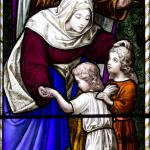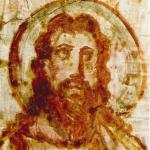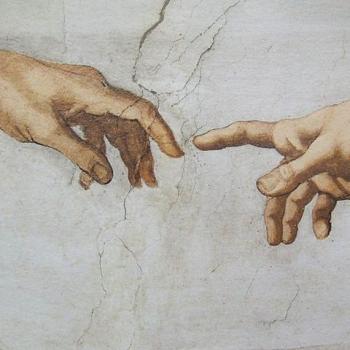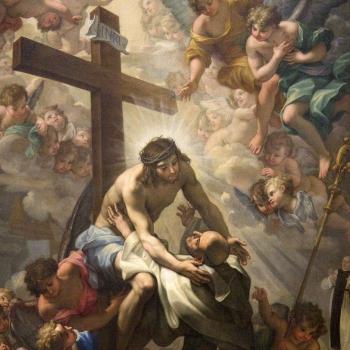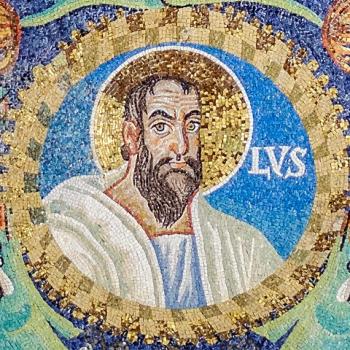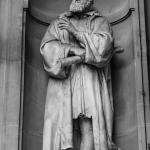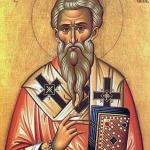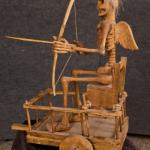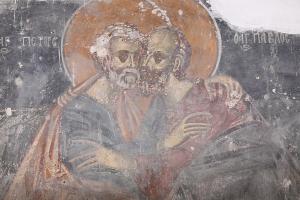
There are two major events in Scripture which show us Christ giving Peter leadership over the temporal, institutional church. The first was when Peter said that he believed Jesus to be the messiah, that is, the Christ. When Peter did this, Jesus replied that he had been inspired to come to this belief, and now, he would have a new name, for before then, he was simply known as Simon. This itself is significant, for in Scripture, someone is given a new name by God to indicate the importance of something they had done, such as when Abram was renamed Abraham, becoming the “father” of “the faithful.” Thus, telling Simon he would now be known as Peter (that is, rock) because of his confession, and upon him and his confession the church would be built, we not only find an indication of Peter’s central position and authority in the church, but also an indication of the divinity of Christ, as Jesus is doing what God is shown to do in other instances in Scripture:
He said to them, “But who do you say that I am?” Simon Peter replied, “You are the Christ, the Son of the living God.” And Jesus answered him, “Blessed are you, Simon Barjona! For flesh and blood has not revealed this to you, but my Father who is in heaven. And I tell you, you are Peter, and on this rock I will build my church, and the powers of death shall not prevail against it. I will give you the keys of the kingdom of heaven, and whatever you bind on earth shall be bound in heaven, and whatever you loose on earth shall be loosed in heaven.” Then he strictly charged the disciples to tell no one that he was the Christ (Matt. 16:15-19 RSV).
The second time Peter was given charge over the church was after Christ’s resurrection. Peter, during the passion, denied his association with Christ three times, so after the resurrection, Jesus had Peter confirm his love for Christ three times. After Peter did this, not only did he receive forgiveness for his infidelity. he was told he was expected to continue in and with that love by helping direct and guide Christ’s sheep, that is, to share that love with others:
When they had finished breakfast, Jesus said to Simon Peter, “Simon, son of John, do you love me more than these?” He said to him, “Yes, Lord; you know that I love you.” He said to him, “Feed my lambs.” A second time he said to him, “Simon, son of John, do you love me?” He said to him, “Yes, Lord; you know that I love you.” He said to him, “Tend my sheep.” He said to him the third time, “Simon, son of John, do you love me?” Peter was grieved because he said to him the third time, “Do you love me?” And he said to him, “Lord, you know everything; you know that I love you.” Jesus said to him, “Feed my sheep. Truly, truly, I say to you, when you were young, you girded yourself and walked where you would; but when you are old, you will stretch out your hands, and another will gird you and carry you where you do not wish to go.” (This he said to show by what death he was to glorify God.) And after this he said to him, “Follow me” (Jn. 20:15-19 RSV).
It is interesting to note that Jesus explained to Peter what would happen at the end of his life. That is, Peter was told that would lose his personal autonomy, finding himself taken to where he did not want to go, which is, his death, and not any kind of death, but his own crucifixion. While Peter would be willing to follow Christ all the way to death, to be a martyr, he did not want to be compared to Christ. This is why he asked not to be crucified the normal way but upside-down, establishing the upside-down cross as a sign of Peter and with it, humility.
Peter’s authority was based upon and so should reflect the love he had for Jesus, so that it was properly established in and by love, and found its potential fulfilled when Peter lived out his life for the sake of others, doing good for them, proving his love for them: “And when the supreme authority for feeding the sheep was given to Peter and the Church was founded upon him as upon the rock, the confession of no other virtue is demanded of him except of love.” [1]
Until the end of his life, Peter would constantly be challenged to discern and live out the expectations of love. He would have to go against his cultural inclinations, such as when he found out that not only would he have to welcome and accept Gentile converts into the church, but that they needed to be treated as equals to his fellow Jewish believers. That meant, at times, had to be willing to listen to and be corrected by Paul, something which might not have been easy to do, as Peter, after all, was human and people often have difficulty accepting just criticism. We should, therefore, not look to Peter only on one day but how he developed throughout his life, to see that what he did at the end of his life, and the humility he showed, was built upon what he did prior to it, so that he could die giving a great representation of Christ and Christ’s love to the world: “When harvest time comes, no farmer expends all his energy cutting the first ear of grain. Nor did Saint Peter earn his reward all at once on the day he was crucified; day by day he collected the ears of grain, binding the sheaf only at his end.”[2]
Paul did not just challenge Peter, but rather, he challenged everyone to follow the expectations of love, including himself. He struggled to live out his faith and engage others in love, as he could be, and sometimes was contentious. But in seeing the struggle in himself, and the weakness he had as a result of the bad habits he created for himself before following Christ, he was able to see the value of accepting that weakness and use it as another tool to present the teachings of Christ to everyone: “Out of love, then, Paul, who could overcome all things, became weak for the weak, because his weakness was more needful to the weak than the power that, had it been kept, would have preserved his dignity intact, but the weak would not have been reformed.”[3]
Paul had to learn to accept all his weaknesses, and when he did, he could use them as a sign to all of us, that we should also accept our own weakness so that we can properly open ourselves up to Christ and be made stronger by grace: “Who is weak, and I am not weak? Who is made to fall, and I am not indignant? If I must boast, I will boast of the things that show my weakness. The God and Father of the Lord Jesus, he who is blessed for ever, knows that I do not lie” (2 Cor. 11:29-31 RSV).
Paul’s intention always was to embrace the way of love, and it is in that fashion, Peter and Paul were able to come together, work together in Rome, promote a unified mission, and die united in spirit, even if their particular martyrdoms took place at slightly different locations. And so, though the church was built upon Peter and his confession, everyone has their own contribution to share; the church cannot be and will not be built by one person, no matter how important and significant that person is in church history. Peter, of course, knew this, and was open to the help which he could and did receive from Paul, and because of it, Peter and Paul are said to have worked side by side, especially with the Christian community of Rome, working to establish and direct it in such a way that both Peter and Paul, and not just Peter, are said to be its founder, making Rome not just the see of one Apostle, but two.
[1] Origen, Commentary on the Epistle to the Romans: Books 1-5. Trans. Thomas P. Scheck (Washington, DC: CUA Press, 2001), 376.
[2] St. Stephen of Muret, Maxims. Tran. Deborah van Doel, OCD (Kalamazoo, MI: Cistercian Publications, 2002), 62.
[3] Origen, Homilies on the Psalms: Codex Monacensis Graecus 314. Trans. Joseph W. Trigg (Washington, DC: CUA Press, 2020), 395 [Homily 9 on Psalm 77].
Stay in touch! Like A Little Bit of Nothing on Facebook.
If you liked what you read, please consider sharing it with your friends and family!
N.B.: While I read comments to moderate them, I rarely respond to them. If I don’t respond to your comment directly, don’t assume I am unthankful for it. I appreciate it. But I want readers to feel free to ask questions, and hopefully, dialogue with each other. I have shared what I wanted to say, though some responses will get a brief reply by me, or, if I find it interesting and something I can engage fully, as the foundation for another post. I have had many posts inspired or improved upon thanks to my readers.


